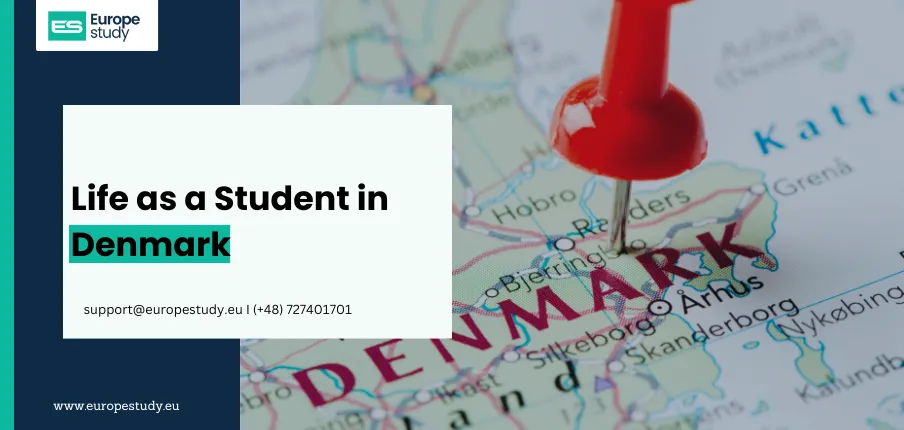
Life as a Student in Denmark
Denmark is one of the happiest countries in the world, and it’s no surprise that it’s become an increasingly popular destination for international students. With world-class universities, a progressive culture, and a focus on work-life balance, Denmark offers a unique experience for students seeking education abroad. But what is life really like as a student in Denmark? In this detailed blog post, we’ll explore everything you need to know about student life in Denmark – from the educational system to student accommodations, culture, and beyond.
1. The Danish Education System: What to Expect
Denmark is known for its high-quality education, and its universities are recognized internationally for their excellence. The country has a robust higher education system that emphasizes creativity, innovation, and critical thinking. Here’s an overview of what to expect:
Structure of Higher Education
Denmark offers various levels of education for international students:
-
Bachelor's Degree: Typically three years (180 ECTS credits)
-
Master’s Degree: Typically two years (120 ECTS credits)
-
PhD: Research-based program, usually lasting 3-4 years
Classes are taught in English at most universities, and many programs are designed to be flexible, with a mix of lectures, seminars, group projects, and hands-on learning. Students are encouraged to actively participate in discussions and collaborate with peers, making it an interactive and engaging learning experience.
University System and Popular Universities
Some of the top universities in Denmark include:
-
University of Copenhagen: Denmark's oldest and largest university, known for its research excellence.
-
Aarhus University: Another leading institution, famous for its research-driven education.
-
Technical University of Denmark (DTU): Known for its technical and engineering programs.
-
Copenhagen Business School (CBS): Specializes in business, economics, and social sciences.
These universities attract students from all over the world, making them culturally diverse and vibrant academic hubs.
2. Student Accommodation: Living in Denmark
Finding suitable accommodation is crucial when studying abroad. In Denmark, students have several options when it comes to living arrangements:
Student Housing
-
Dormitories (Kollegium): Most Danish cities offer student dormitories, where you can rent a room in a shared apartment. These dorms are typically located near universities and are popular among students due to their affordability and convenience.
-
Private Apartments: For those seeking more independence, private apartments are available, but they tend to be more expensive than dorms. Renting a private apartment might be a good option if you're looking for more privacy or have specific preferences regarding location and amenities.
-
Shared Housing: Many students opt for shared housing with other students. This can reduce rent costs and provide an opportunity to meet new people and experience local culture.
Renting Costs
Renting an apartment or dormitory room in Denmark can be expensive, particularly in Copenhagen and Aarhus. On average, you can expect to pay around DKK 3,500 – DKK 6,000 per month for a shared room or apartment, with costs generally higher in larger cities.
Utilities
Most student accommodations include utilities in the rent, but if you're renting privately, you’ll need to account for additional costs like electricity, heating, and internet.
3. Social Life: Cultural Experiences and Networking
Student life in Denmark is rich with social and cultural experiences. Whether you’re interested in exploring Denmark’s history or engaging in modern-day social activities, there’s always something to do.
Student Organizations and Events
Universities in Denmark have a strong sense of community, and student organizations are an integral part of campus life. These organizations often host events such as:
-
Social gatherings: From welcome parties to casual get-togethers.
-
Cultural events: Including international food festivals, movie nights, and talent shows.
-
Networking opportunities: Career fairs and industry meet-ups are organized to connect students with potential employers.
Cafes, Bars, and Restaurants
In major cities like Copenhagen, Aarhus, and Odense, the social scene is vibrant, with plenty of cafes, bars, and restaurants to explore. Students often gather in local spots to socialize, relax, and even study. Denmark’s cozy and “hygge” culture (the Danish concept of coziness and comfort) makes it easy to unwind in these spaces.
Public Transport
Getting around in Denmark is easy and affordable, especially in larger cities. Copenhagen, for instance, has an efficient metro, bus, and train system that is student-friendly, with discounts available for students. Biking is also a popular mode of transport, and most cities have extensive bike lanes.
4. Work-Life Balance: Why Denmark Stands Out
Denmark is known for having a great work-life balance, and this philosophy extends to student life. Unlike some countries where students may feel pressured to study non-stop, Denmark emphasizes a balanced approach to education, encouraging students to take time for relaxation, hobbies, and socializing.
Flexible Study Hours
In Denmark, students are generally expected to manage their own time. Most programs are designed with a great deal of flexibility, allowing students to balance their studies with personal activities. Assignments and exams are spread throughout the year, and professors are approachable, providing a supportive learning environment.
Part-Time Work Opportunities
If you’re looking to supplement your finances or gain some work experience, Denmark has a relatively open labor market. As an EU/EEA or non-EU student, you can work up to 20 hours per week during the semester and full-time during breaks. Jobs range from working in cafes and restaurants to internships and positions related to your field of study.
Student Discounts
Students in Denmark enjoy discounts on public transport, museums, and even on various shops. Don’t forget to get your Student ID (often through your university) to take advantage of these offers.
5. Cost of Living in Denmark
Living in Denmark as a student can be pricey compared to other European countries, but the overall quality of life is high. Here's a breakdown of typical expenses:
-
Accommodation: DKK 3,500 – DKK 6,000 per month
-
Groceries: DKK 2,000 – DKK 3,000 per month
-
Public Transport: DKK 300 – DKK 500 per month (depending on the city)
-
Dining Out: Around DKK 100 – DKK 150 for a meal at an inexpensive restaurant
Although Denmark is expensive, the high level of student support, affordable healthcare, and excellent public services make it a valuable investment in your future.
6. Health Care in Denmark
Denmark offers high-quality healthcare, and as a student, you’ll have access to the public health system. If you're an EU/EEA student, you’ll likely be covered by your European Health Insurance Card (EHIC). Non-EU students may need to purchase health insurance, but this is often required as part of the visa process.
7. Visa and Residence Permits for International Students
For students from outside the EU, Denmark requires a residence permit to study. Generally, you’ll need to prove that you are enrolled in a full-time program at a recognized institution, and that you have sufficient funds to support yourself during your stay. The permit allows you to work part-time during the semester and full-time during breaks.
Conclusion: Why Study in Denmark?
Denmark offers a top-tier education system, a supportive student community, and a rich cultural experience that makes it an excellent destination for international students. Whether you're looking to experience life in a Scandinavian city, develop professionally, or simply enjoy a high quality of life, Denmark has something to offer every student. With its emphasis on work-life balance, quality education, and modern infrastructure, Denmark is one of the best places for students to live and study.
For those considering studying abroad, Denmark should be at the top of your list. It’s a place where you can grow academically, socially, and personally, all while enjoying a safe and inclusive environment.





